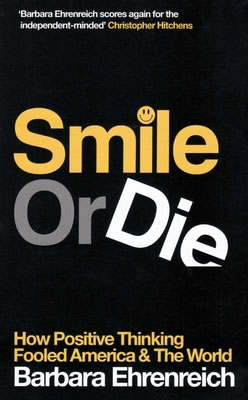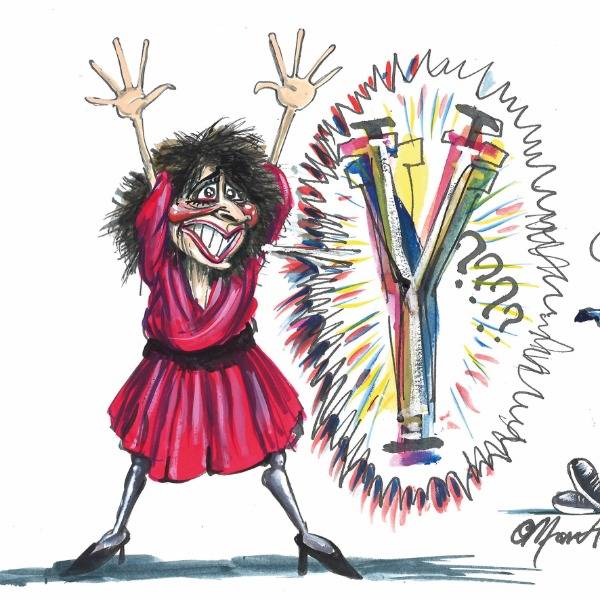 “Look on the bright side”: as someone with a long-term disabling health condition, I am used to hearing such comments. Behind them is an all too frequently unspoken accusation – if you are unwell, if illness gets you down, then somehow it’s your fault for not having a positive enough attitude. As Barbara Ehrenreich in her superb Smile or Die shows, positive thinking is not just a matter of well-meaning but naive optimism, but a pernicious and oppressive ideology that underpins many of the most rapacious aspects of American capitalism.
“Look on the bright side”: as someone with a long-term disabling health condition, I am used to hearing such comments. Behind them is an all too frequently unspoken accusation – if you are unwell, if illness gets you down, then somehow it’s your fault for not having a positive enough attitude. As Barbara Ehrenreich in her superb Smile or Die shows, positive thinking is not just a matter of well-meaning but naive optimism, but a pernicious and oppressive ideology that underpins many of the most rapacious aspects of American capitalism.
The author’s own experiences with breast cancer provide the first chapter in a journey into a kind of perpetually sunny, toxic wasteland of pseudoscience, blind faith and good old-fashioned hegemonic ideology. Within the subculture of breast cancer charities and support groups, the injunction to have a positive attitude is not just an unbreakable orthodoxy, it also formed part of a mythology in which – contrary to research – cancer can be “beaten” by strength of will. What Ehrenreich calls this “sugar coating of cancer” can force sufferers to deny feelings of anger and depression.
Smile or Die also shows how positive thinking forms the ideological backbone of a vast and growing “motivation” industry. Motivators such as Anthony Robbins command huge fees for speaking engagements and private “coaching” sessions. Books such as Who Moved My Cheese? and The Power of Positive Thinking sell in the millions. The content may differ but, as Ehrenreich shows, the core messages remain the same: don’t think negative thoughts, don’t dwell on your lot, you have the power to do anything, if anything bad happens then it is only your fault. More extreme formulations of this message verge on the cult-like: many motivators advise not watching the news and cutting contacts with “negative” people.
The positive thinking cult can display a peculiarly corrosive mix of mysticism and mammon. One of the most successful motivational texts, Rhonda Byrne’s The Secret, claims to expose the suppressed wisdom of the ages: the so-called “law of attraction”. This “law” claims that the power of the mind is such that if one asks “the universe” for something with enough sincerity and effort, then you will “attract it”. And what does this solemn ancient lore allow you to “attract”? The answer is hilariously prosaic – “stuff”. One example that Byrne quotes is of a ten-year-old boy who wanted to be first in the queues at Disneyland and whose wish was granted by “the universe” when his family were randomly chosen by Disney to get free passes.
But positive thinking isn’t just materialism dressed up as New Age cobblers. As Ehrenreich shows, it has made substantial inroads into Christianity. In the new breed of stadium-based “mega churches”, such as Joel Osteen’s Lakewood Church in Houston, preachers exort the faithful to treat God the way Byrne treats “the universe”. God is someone you ask for stuff from and if you don’t get it, well, maybe you just weren’t showing enough faith. Preachers of this “prosperity theology” show no shame about flaunting their wealth – televangelist Joyce Meyer owns a private jet and a $23,000 marble toilet.
If exposing such charlatans is like shooting fish in a barrel, the emerging science of “positive psychology” requires Ehrenreich to take a more forensic approach. As she shows, academic proponents of positive psychology such as Martin Seligman often wildly overstate the evidence for the health and other benefits of positive thinking.
All of this positivity is of course awfully convenient in the capitalist America of the last few decades. Positive thinking legitimises the power structure of a country in which job security has been eroded in an epidemic of “downsizing”, in which the wealth of the few has sky-rocketed while the middle class struggles and the working class drops off the map. If success and prosperity are a matter of personal willpower then any anger and any attempt to change society are a “negative” waste of time. As Ehrenreich shows, when employees can be made to embrace positive thinking, there is a greater chance they will accept their lot without complaint. The potential for abuse is enormous – one firm even water-boarded one employee to demonstrate that the rest of them should struggle for sales as hard as he was struggling for breath. In the period leading up to the current economic crisis, bankers who counselled caution in lending were often ostracised.
I should point out that the title of the UK version of the book is different from the US version: there is very little about the rest of the world in the book. One wonders how far the UK has been overtaken by the cult of positivity. Perhaps British cynicism provides something of a bulwark, but I’ve seen enough copies of The Secret on the tube to be worried.
Smile Or Die is published by Granta

